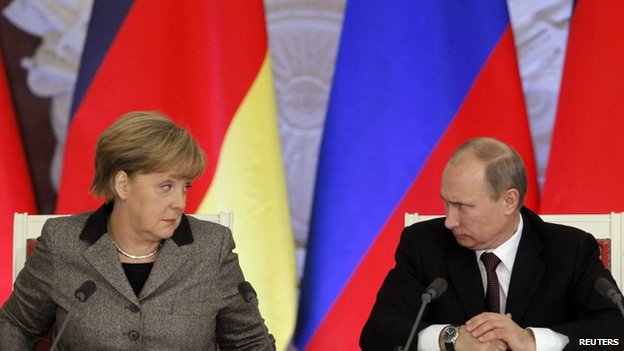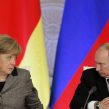
Chancellor Merkel Insists on Russian Observance of Armistice in Ukraine
Publication: Eurasia Daily Monitor Volume: 11 Issue: 191
By:

The German government has come round to the view that Russia’s actions against Ukraine potentially threaten the “European peace order.” Policy debates in Germany reflect, belatedly and still tentatively, this assessment (see accompanying article).
Germany has not yet initiated a policy review in keeping with that broad conclusion. For now, Berlin focuses on Russia’s breaches of the armistice in Ukraine, responding with economic sanctions to that problem.
Russia’s proxy forces continue attacking Ukrainian positions in Donbas (eastern Ukrainian region comprising of Luhansk and Donetsk provinces) on a daily basis since the September 5 ceasefire, seeking to capture key objectives beyond the September 19 armistice lines. Russia also persists with threats to destabilize Ukraine beyond Donbas through the Novorossiya project and political warfare against Kyiv.
Chancellor Angela Markel has launched an initiative to bring Russia into compliance with the armistice terms. Merkel has taken over the lead role on this issue and on Ukraine policy as a whole from Foreign Affairs Minister Frank-Walter Steinmeier.
Moscow’s flouting of the armistice seems to affect the German government directly in an unusual way. Berlin had pushed for an armistice all along, pressuring Ukraine into a series of unilateral concessions to Russia (see EDM, June 20, 24, 26, 27, July 3, 11, 18). Moreover, Berlin insisted all along to entrust the Organization for Security and Cooperation in Europe (OSCE) with monitoring the armistice. This pre-determined a poorly monitored armistice and an unmonitored border. Thus, Berlin shouldered a measure of political responsibility for the consequences of its diplomacy and a flawed armistice.
Addressing the Bundestag on October 16, Merkel announced Germany’s initiative to uphold the implementation of the armistice in Ukraine. For added credibility, she undertook herself this initiative as Chancellor (rather than delegating it to Foreign Minister Steinmeier), and she had it incorporated into the government’s programmatic declaration. Merkel brought her proposals to Russian President Vladimir Putin and top European leaders during the Milan summit on October 16–17, which Ukrainian President Petro Poroshenko attended (see EDM, October 22); she developed the proposals in a speech in Bratislava on October 20; and based on those terms, the European Union decided, on October 24, to maintain the existing sanctions on Russia, until the latter abides by the armistice in Ukraine. The priority elements in Merkel’s initiative can now be pieced together (bundeskanzlerin.de, October 16, 17, 20, 23, 24):
— Observance of the ceasefire in the field along the ceasefire lines (this point addresses the Russian-led forces’ continuing attacks beyond the September 19 ceasefire lines);
— Removal of Russia’s troops and heavy weaponry from what is legally Ukraine’s territory in Donbas (the Russian government denies it, but intelligence collected by the United States and the North Atlantic Treaty Organization, NATO, confirm that military presence);
— International monitoring of the armistice lines and the buffer zone within Ukraine’s Donbas, under the aegis of the OSCE (at present, Russia alone can conduct effective surveillance of the area);
— Effective protection of the inter-state Russia-Ukraine border, also under the OSCE’s aegis (Russia’s proxy forces control a 300-kilometer stretch on what is legally the Ukrainian side of that border);
— Local elections in the entire territory of the Donetsk and Luhansk provinces (i.e., including the areas under secessionist control) to be held under Ukrainian legislation and on schedule on December 7, as a test of Russia’s attitude toward Ukraine’s territorial integrity (the two “people’s republics” have scheduled their own elections for November 2).
Merkel has singled out those goals as urgent priorities at this juncture. However, she calls for implementation of the two armistice documents “in all of their points” (nine and twelve points, respectively): “Full application of the Minsk agreements is essential,“ Merkel insists; “Ukraine’s territorial integrity must be guaranteed not only on paper, but through deeds, starting with Russia persuading the two “people’s republics” to allow the holding of elections under Ukrainian jurisdiction (bundeskanzlerin.de, October 16, 17, 20, 23, 24).
The two armistice documents, signed in Minsk on September 5 and September 19–20 (“Minsk agreements”), with all their flaws, are the main diplomatic instruments that Ukraine can invoke to protect its interests vis-à-vis Russia in this conflict.
Ukraine’s current predicament is a familiar one to Georgia and Moldova: these countries were forced into a Russian-dictated armistice agreements, which then became their only recourse against Russian abuses of the agreed terms. That recourse was seldom, if ever, effective. Ironically, the aggressed countries risked legitimizing those agreements by invoking them for protection against the same aggressor country.
Merkel is becoming increasingly (and uncharacteristically) critical of Moscow’s actions against Ukraine, and concerned about the implications beyond Ukraine. However, Merkel (and any government in this situation) has no choice but to turn to the same Moscow in attempting to salvage the armistice agreements. In standing up for observance of the armistice agreements, Merkel is implicitly and explicitly acting in Ukraine’s interest at this time.
With this initiative, Berlin seeks to fill the leadership vacuum in the European Union, as well as answer US expectations that Europeans should take primary responsibility for managing European problems.
The Kremlin seems highly unlikely to deliver on any of those points any time soon. Continuing sabotage of the armistice would strengthen the case for maintaining economic sanctions on Russia on both sides of the Atlantic, with critical-mass support from Germany on the European side.




